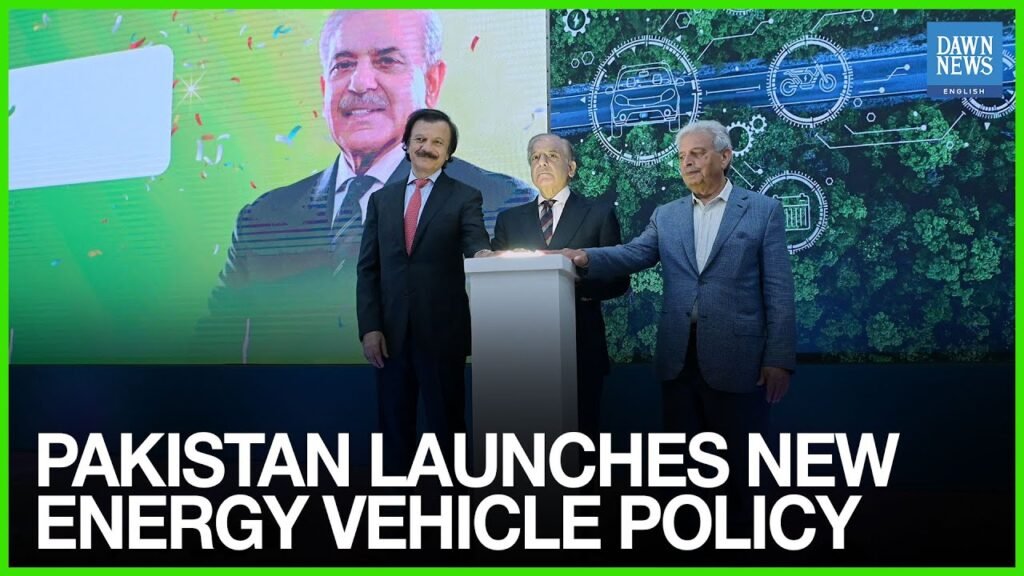
Prime Minister Shehbaz Sharif unveiled Pakistan’s New Energy Vehicle (NEV) Policy 2025-30, describing it as a landmark initiative to tackle the country’s intensifying climate crisis, cut petroleum imports, and usher in a new era of green industrial growth.
The policy, which promotes electric mobility and clean transportation, has been hailed as both a timely response to global environmental imperatives and a bold attempt to reshape Pakistan’s economic and industrial future.
At the launch ceremony, the prime minister underscored Pakistan’s acute vulnerability to climate change despite its negligible contribution to global carbon emissions. He pointed to the devastating 2022 floods that caused over USD 30 billion in damages, alongside recurring monsoon catastrophes and heatwaves that continue to threaten millions. “Pakistan is among the ten countries most affected by climate change,” Sharif said. “Our carbon footprint is negligible, yet our people, economy, and infrastructure suffer the most.”
The new policy seeks to accelerate the transition to electric vehicles (EVs), offering incentives such as toll exemptions, financing reforms, subsidies, and free registration. It also includes the distribution of electric bikes and 100,000 laptops to top-performing students, with a 10 percent quota reserved for Balochistan. “This is not only an environmental measure but an investment in the country’s youth, who will lead Pakistan into a greener future,” the premier emphasized.
Special Assistant to the Prime Minister on Industries and Production, Haroon Akhtar Khan, described the initiative as a “blueprint for Pakistan’s clean transport revolution.” He explained that the NEV Policy would not only reduce petroleum demand but also help the country shift from vehicle assembly toward manufacturing advanced EV components, batteries, and charging equipment. “This green revolution is the future of Pakistan,” Khan remarked, noting that running an electric motorcycle costs less than one-third of what it takes to operate a petrol-based one.
Federal Minister for National Food Security Rana Tanveer Hussain hailed the launch as a historic moment, asserting that the policy had been designed in alignment with international environmental standards. Ambassadors, federal ministers, and top-performing students from across Pakistan attended the ceremony, while the government hinted at plans to increase the current Rs 9 billion education support budget in the upcoming fiscal year.
However, while optimism around the NEV Policy runs high, experts warn that significant bottlenecks and challenges threaten to delay or dilute its impact. Chief among these is the lack of infrastructure to support mass EV adoption. Pakistan currently has a negligible number of charging stations, raising concerns about accessibility, especially in rural areas where power supply is already unreliable. Without a robust nationwide charging network, the dream of widespread electric mobility may remain out of reach.
Another pressing issue is the country’s fragile energy sector. Pakistan continues to grapple with power shortages, high transmission losses, and dependence on imported fuels for electricity generation. Unless renewable energy is significantly scaled up, critics fear that charging EVs may simply transfer the burden from oil imports to electricity imports, undermining the environmental and economic benefits of the policy.
The financial dimension is equally daunting. Although subsidies and tax exemptions are built into the policy, high upfront costs of EVs remain a barrier for average households and small businesses. Local manufacturing of batteries and EV parts—vital to reducing costs—will require substantial foreign investment, technology transfer, and skill development. Ensuring strict compliance from international partners, as stressed by Khan, will be critical to avoiding delays.
Industry readiness is another hurdle. Pakistan’s automotive sector has long been centered on conventional vehicle assembly, with limited capacity for innovation. Transitioning toward electric mobility will demand retraining workers, restructuring supply chains, and incentivizing companies to invest in EV technology. Without adequate government-industry coordination, the policy risks faltering in execution.
Policy continuity also raises concerns. With Pakistan’s political transitions often derailing long-term projects, stakeholders fear the NEV Policy may face setbacks if not insulated from political turbulence. Experts stress the need for bipartisan consensus and legal safeguards to ensure the policy’s sustainability through 2030.
Finally, financing challenges loom large. Pakistan is already under immense fiscal strain and has limited room to take on new loans. While Sharif has appealed to the international community for greater climate assistance, uncertainty remains over whether sufficient global financing will materialize. Without international support, Pakistan may struggle to fund both infrastructure and incentives critical to the NEV Policy’s success.
In his address, the prime minister acknowledged these concerns, reiterating that Pakistan cannot shoulder the costs of climate recovery and green transition alone. “We are no longer in a position to bear the weight of more loans or financial strain,” he said. “The international community must step up and support vulnerable states like Pakistan in building resilient infrastructure.”
For now, the launch of the NEV Policy represents a bold declaration of intent: to cut emissions, reduce oil imports, generate green jobs, and empower youth. But whether Pakistan can navigate the complex landscape of financing, infrastructure, industry readiness, and political will remains the ultimate test for turning this ambitious vision into a reality. – ER REport
